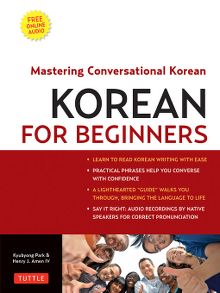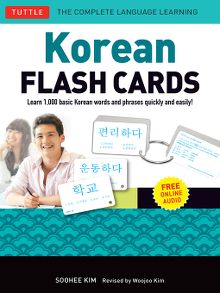A Librarian's Guide to Learning Korean
Are you interested in learning Korean? Well, the New York Public Library can help! Here's an overview of Korean, followed by a list of links and books in the NYPL catalog that can help you learn the language.
An overview of Korean
Unlike some languages that have multiple writing systems—Japanese has three—Korean only has one writing system that you must know to survive, and that’s Hangul. If you work hard, you could probably learn it in a day. That's because the Korean writing system is very systematic, with characters for consonants and for vowels. All you are really doing is putting them together in a certain way.
It is actually recommended to learn the Korean writing system first, as the romanized version of Korean can be off and vary with different textbooks.
Grammar-wise, Korean is structured as subject-object-verb, whereas English is subject-verb-object. So the sentence "I like coffee" in English is more like "I coffee like" in Korean. There are also different degrees of politeness in speech depending on who you are talking to, based on whether the person is your superior, their age (older or younger than you), and other factors. Age and politeness are important in the language, but one can get used it to over time.
No matter what your reason for learning Korean—the music, TV shows, food, culture—despite the challenges involved, these resources should be able to help you in your quest.
Learning Korean: books

Essential Korean Vocabulary by Kyubyong Park
This book has thousands of words for you to learn, separated into different categories such as the human body, feelings, plants, and a lot more. This is useful if you have a grasp of Korean grammar and need to brush up on vocabulary.

Essential Korean Grammar by Laura Kingdon
This is a very comprehensive grammar guide for learners of all levels, from beginner to advanced. It offers a variety of sample sentences for each lesson.

Colloquial Korean by Danielle Ooyoung Pyun
This is another quick and comprehensive guide to Korean. It covers grammar and vocabulary, and even has some cultural points, too. It’s like a mini-textbook for Korean, with a couple of exercises you can do to practice.

Korean for Beginners by Henry Amen IV
The author of this book has a sense of humor that keeps you reading and learning! The material is explained simply and is easy to follow. Because this is an e-book, you can also read it on the train with the simply-e app!

Korean Flash Cards by Soohee Kim
Another e-book, which makes it very convenient to study and learn vocabulary on the go. Each vocabulary word has similiar words that go along with it to help with building word associations.
Learning Korean: websites
Mango Languages, offered by the Library, is a great start to learning Korean and other languages.
Duolingo offers a nice beginner’s course in Korean; if you’ve used Duolingo before, this is definitely ideal. You can even join a club and compete with others in your learning journey.
Memrise offers something for everybody, and you can begin your lessons with the courses created by Memrise. They are nice because they sometimes have native speakers whose sentences you have to translate. You can also jump over to a user-created course or make your own!
HiNative is useful if you need a native speaker to answer your questions, especially if you want to figure out nuances or a better way of saying something.
LP’s Korean Language Learning is a comprehensive guide to Korean grammar. Once you know Hangul, this should be helpful in understanding how to say various basic expressions. There’s also a PDF version of the guide so you can readit as an e-book or have a printer-friendly version.
How to Study Korean covers Hangul and goes up to advanced Korean grammar. It is very wide in range in the material it covers, so there is something for learners at all levels!
Talk to Me in Korean is known more for their podcasts, which many people find useful, but it seems the website has recently changed formatting. For now, you can check out the archived version of the site to compare. After you sign up, you can take a quiz to see your skill and then take the appropriate free lesson to help.
Go Billy! offers a variety of lessons and also has videos about Korean culture. Once you know Hangul, watching these videos is a useful way to build your listening skills, with subtitles offered in both English and Hangul. The Library also has a related book, Korean Made Simple, if you prefer, but as of this writing, it has 14 holds!
Viki is amazing if you love K-dramas, but also if you want to learn Korean, too! Viki now offers a learn mode, with which you can see translations and learn vocabulary while watching TV shows. So far, this only works on the desktop version of the site, but it's a good way to watch dramas and learn at the same time.
LingoDeer is, for the moment, only available as an app for phones and tablets; however, consider it another useful resource for learning Korean. If you like Duolingo, then you will definitely love this as it focuses on Japanese, Korean, and Mandarin Chinese.
Children's books
Once you can read Hangul, you can get started reading any of these books. It might discourage you, but only you will know what kind of learner you are. The following range from basic picture books to some fiction, all of which can help strengthen your Korean skills.
여기 여기 is as basic as it gets. If you know some basic Korean vocabulary, you can read and get the gist of this board book—plus, it is adorable!
재미 있는 내 얼굴 helps teach vocabulary associated with various feelings. Even if your vocabulary is very limited, with the help of an online dictionary this board book will help strengthen it.
아빠는어디쯤왔을까? is a cute story about a girl wanting to eat some ice cream with her dad. Even if you are beginner, you can get the gist of this book.
Why? 마술 과학 is part of a popular science-based comic series for kids, so you get to learn some science in a fun setting and practice your Korean reading skills! Recommended for those whose vocabulary and grammar range is intermediate to advanced.
복제 인간 윤 봉구 looks like a good challenge for the intermediate/advanced reader. It has something to do with a boy being cloned, and there are some illustrations here and there. If you do happen to read it, let us know in the comments how it is!
샬롯의거미줄 is the ultimate challenge! Can you read Charlotte's Web in Korean? Are there any differences between this and the English-language one? Anything that you found interesting? Let us know in the comments below!
Read E-Books with SimplyE
 With your library card, it's easier than ever to choose from more than 300,000 e-books on SimplyE, The New York Public Library's free e-reader app. Gain access to digital resources for all ages, including e-books, audiobooks, databases, and more.
With your library card, it's easier than ever to choose from more than 300,000 e-books on SimplyE, The New York Public Library's free e-reader app. Gain access to digital resources for all ages, including e-books, audiobooks, databases, and more.
If you don’t have an NYPL library card, New York State residents can apply for a digital card online or through SimplyE (available on the App Store or Google Play).
Need more help? Read our guide to using SimplyE.
Comments
Learning Korean Article
Submitted by Justin Sanabria (not verified) on January 6, 2019 - 8:50am